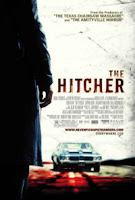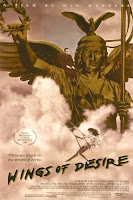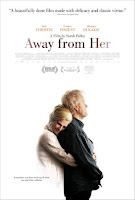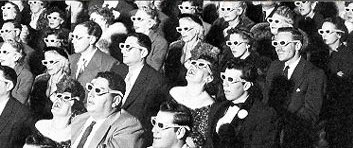
My issue is to do with the villains. I didn't like them at all, but not in the "they're the bad guys, duh!" way. They made me feel unpleasant, and that's not something I want to feel in a movie. I can feel scared, nervous, tense, disturbed even (I would champion a film if it made me feel these things), but unpleasant isn't a feeling I enjoy having. It's a feeling when I don't want to watch the movie anymore. When no matter how good everything is (the acting or whatever) I just feel uncomfortable like I've got an itch under my skin and I ask myself "Why am I watching this?". I felt a really deep repulsion inside of me whenever these characters were on screen and it's a feeling that makes me sick to my stomach, quite frankly. Some people may find this trait in a movie to be a positive thing (especially in a movie such as Funny Games), I most certainly do not. I got this feeling during Romper Stomper. I got this feeling during Saw II. I got this feeling during The Last King of Scotland. And I got it during several other movies. I didn't find Funny Games scary, or tense, or nerve-racking or disturbing. I found it to be an unpleasant experience.
I'm sure Haneke had a reason for doing the things he did in this movie, but doesn't the idea of omnipotent villains sort of defeat the purpose of even making the movie in the first place? If the killers can simply reverse time to stop an attack against them then it renders the entire movie invalid and I feel cheated. Where's the payoff? I was reminded of recent French horror film Ils. That movie had a very bleak ending, but it was an ending that worked for the film. This end here just felt like a cheat, like I was being mocked for, GOSH, having the gaul to want a proper ending.
The scenes that did work were those without the villains (I can't be bothered finding out their names, quite frankly). The scenes after the incident (you'll know it if you've scene it) when the couple are alone in the house were tense and were scary. But then when the villains show back up and start, quite literally, reversing time it goes back to being an uncomfortable - and often silly - waste of time. What is the point of this movie? That filmmakers are manipulaters? Fiction is morphing into reality? By golly, that's a new one!
 I will be interested to see how Haneke handles the reigns on the American remake (I will be interested on DVD, mind) to star Naomi Watts, Tim Roth and
I will be interested to see how Haneke handles the reigns on the American remake (I will be interested on DVD, mind) to star Naomi Watts, Tim Roth and It was nice to see Ulrich Muhe though!






4 comments:
Well, I'd say the entire point behind everything Haneke's made is highlighting that awkward relationship we have with violence. We want to see it, but we don't want to see it. We want/need something to happen in order for there to be a story, so we, as viewers, are responsible for whatever occurs, or at least he tries very hard to point that out. It's basically taking Hitchcock's identification with the criminal (see: Norman Bates cleaning the bathroom scene) a step further, right on into meta- territory.
I honestly think it's a bit clunky and dated in Funny Games, and like what he did in Cache more, where I think he's still playing the same tune, only instead of the whole rewinding and changing the outcome (because it's what we want, as viewers, he says), our gaze into these people's lives is the very force that invades the narrative, causes all the problems, and destorys their lives. It's the very act of our looking - which turns up on their doorstep as videotapes - that is destructive yet compulsory.
(and I continue!) But that's not to say I think the original Funny Games doesn't have its merits (obviously; you know this about me already). I really don't want to sound pretentious about this - gah I hate pretentious film-speak bullshit - but Haneke's intellectualizing the horror well past the point of actively worrying about if it's some scare-a-thon. The reasons things happen in his movies are following their own outside logic set to suit his ideas about the relationship of viewing versus participating; and I don't blame anyone at all who balks at finding his films fascinating. I just do. I like piecing together his thoughts. I like the way he's fascinated by that relationship, because I am too, and I could watch him make overly-esoteric films forever on the subject. He gets a free pass from me on a lot of stuff because he's making movies about the thing that fascinates me most about movie-making.
As I said, I liked Hidden (that was it's title down here, not Cache) much more. I think Haneke's filmmaking methods and his ideas about voyeurism (if you will) and violence effects us and the people involved were used to much greater effect there.
I just... aagh. OMNIPOTENT! It's like how Superman can only be defeated by kryptonite. A superhero isn't interesting if he's unbeatable apart from some weird foreign rock. And I guess I just had an adverse reaction to Haneke's decision (whether it be the entire film's reason for existing) to make the villains these omnipotent nigh on supernatural beings. I may have even handled it if it was Haneke rewinding the tape, but he makes the villain do it by rewinding on a remote?! huh?
...anyway. How exactly are millions of uninformed Americans going to react to this? Not well at all is my guess (but for different reasons than me).
Well, the villains of Funny Games, the whole idea behind them, is that they are us, the viewer, they are doing what we're telling them to. That we, as human beings, need conflict, need something to happen in order to create a story, and they are representations of that, the human need for conflict, and Haneke's whole deal is throwing that in our faces to make us think about it. He isn't aiming to just tell a straightforward "family unit terrorized by outside forces" story like Ils or any number of movies preceding that one; what he's interested is in is dissecting that narrative and looking at what drives us to want to see it.
With a Haneke movie I always have the impression that if his camera were never pointed at his characters nothing bad would happen to them; that the family in FG would have had a lovely vacation. For Haneke, it's the very act of imposing a narrative onto life that is disruptive.
Like I said, I think the videotapes-schtick in Cache/Hidden works better than turning that force into actual characters here in FG, but I do think they represent the same exact thing in Haneke's world.
So I guess my argument is I feel like you're looking at the "villains" in FG too literally. Haneke isn't raising the questions, or plain just doesn't care about the questions, that you're looking for with what he's doing. I think the whole rewinding thing that is frustrating you because is exactly what he wants to do; it's one of the points when the story stops being about what you think it's about and turns it on its head and becomes what he wants it to be about. Same thing when the villains talk to the camera and basically implicate us all in driving the story along. This is what we want, right? Conflict? There is no story without conflict. Otherwise the family would just be sitting there having a nice vacation, and who wants to watch that?
Post a Comment